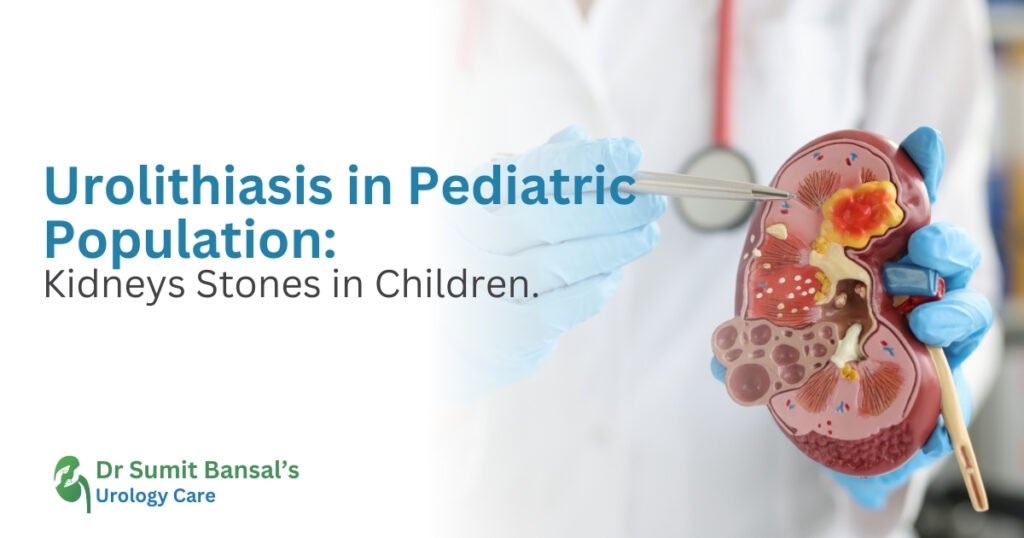Kidney stones, medically known as urolithiasis, are often considered a problem of adults. However, children can also develop this painful condition. The rising incidence of pediatric kidney stones worldwide has become a growing concern for parents and healthcare professionals. Early recognition and timely treatment are crucial to prevent complications and safeguard a child’s kidney health.
As a Minimal Access Urologist, Uro-Oncosurgeon, and Kidney Transplant Surgeon, Dr. Sumit Bansal provides expert care in diagnosing and managing kidney stones in children with advanced, minimally invasive techniques.
What is Urolithiasis in Children?
Urolithiasis refers to the formation of stones in the urinary tract, including the kidneys, ureters, bladder, or urethra. In children, stones are typically composed of calcium oxalate, uric acid, or cystine. These stones can range in size from tiny crystals to large obstructing masses, leading to urinary difficulties and severe pain.
Causes of Pediatric Kidney Stones
Several factors contribute to kidney stone formation in children, including:
Genetic predisposition – Family history of stones increases risk.
Dehydration – Inadequate water intake is a common cause.
Dietary habits – High salt intake, processed foods, and excess protein can trigger stones.
Metabolic disorders – Conditions like hypercalciuria or cystinuria.
Urinary tract infections (UTIs) – Repeated infections can encourage stone formation.
Certain medications – Long-term use of some drugs may also be a factor.
Signs and Symptoms in Children
Unlike adults, children may not always express the classic kidney stone pain. Common symptoms include:
Severe flank or abdominal pain
Nausea and vomiting
Painful urination or blood in urine
Frequent urge to urinate
Recurrent urinary tract infections
Irritability or restlessness in younger children
Parents should consult a qualified urologist if any of these symptoms persist.
Diagnosis of Urolithiasis in Children
Timely diagnosis is essential to prevent kidney damage. Pediatric urologists may recommend:
Ultrasound – Safe and radiation-free imaging for children.
CT Scan (Low-Dose) – For accurate detection in complex cases.
Urine and blood tests – To identify underlying metabolic disorders.
Stone analysis – To prevent recurrence by understanding stone composition.
Treatment Options for Pediatric Kidney Stones
The treatment plan depends on the child’s age, stone size, location, and overall health. Options include:
Conservative Management
Increased fluid intake
Dietary changes (low salt, balanced calcium, limited junk food)
Pain management
Minimally Invasive Procedures (expertly performed by Dr. Sumit Bansal)
Ureteroscopy (URS) – Using tiny instruments to remove stones.
Percutaneous Nephrolithotomy (PCNL/Mini-PCNL) – Keyhole surgery for larger stones.
Extracorporeal Shock Wave Lithotripsy (ESWL) – Non-invasive procedure using sound waves to break stones.
These advanced techniques ensure less pain, faster recovery, and minimal scarring in children.
Preventing Kidney Stones in Children
Prevention plays a vital role in pediatric urolithiasis. Parents can help reduce risks by:
Encouraging adequate water intake
Promoting a balanced diet with fruits and vegetables
Reducing salty and processed foods
Managing body weight and avoiding excess junk food
Scheduling regular check-ups with a pediatric urologist if there is a family history
Expert Pediatric Urology Care with Dr. Sumit Bansal
Kidney stones in children can be distressing, but with timely intervention, most cases are treatable without long-term damage. Dr. Sumit Bansal, practicing at Manipal Hospital, Gurugram & Dwarka, specializes in pediatric urology and minimally invasive stone surgeries. His compassionate approach ensures children receive safe, effective, and tailored treatment for lasting relief.
📞 For consultation, contact: +91 9599 555 945


